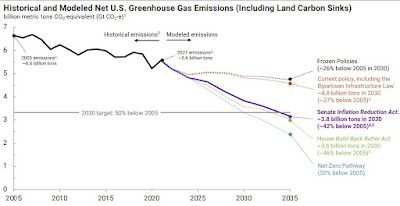Not the Irish Republican Army or an Individual Retirement Account, or the Green New Deal, the Inflation Reduction Act, signed into law last week, is an investment in clean energy, energy savings, and transitioning from fossil fuels.
While there's a huge list of things left out of the bill, including disturbing give-aways to the fossil fuel industry, there are many big programs that will help reduce carbon emissions, and, these days, that has to be the main concern. The counter-productive fossil fuel gimmes may not matter as much as feared as more switch to increasingly cheaper renewables.
For regular people, according to this Fast company summary:
One key part of the new law is a set of rebates aimed at low- and moderate-income households. Households making between 80% and 150% of the area median income can get back half of the cost of specific energy upgrades, while those making less than 80% of the median income can be fully rebated, up to a certain cap. The incentives include:
- Up to $8,000 for a heat pump for heating and cooling
- Up to $4,000 to upgrade your electrical panel (to prepare for an all-electric home)
- Up to $2,500 for new wiring
- Up to $1,750 for a heat pump water heater
- Up to $1,600 for insulation, air sealing, and ventilation
- Up to $840 for an electric stove, oven, or an electric heat pump dryer
On the transportation front, some credits for purchasing electric cars (even used cars) have been expanded and extended, but credits for eBIKES are nowhere to be found. This is a terrible omission, but, depending on the outcome of the November election, it could be fixed. And, local or state-level incentives could fill the gaps for a time.
Support for cleaner mass and active transit was included in the bill, including access and equity grants for improving walking and biking infrastructure.
As more details emerge and experts figure out who is eligible for what IRA benefits, communities like La Crosse are moving forward with plans to reduce our own community carbon emissions.
The draft Climate Action Plan is now ready for public review and comment. If you haven't yet read through it, please do. It's possible that action steps identified in that document will be made easier by the new IRA.
Between now and election day, we can move forward by
- Reading, commenting on, and supporting the La Crosse Climate Action Plan;
- Learning what incentives you can use to reduce your energy use and replace carbon-high appliances and vehicles with carbon-low (a great first step is getting a Focus on Energy Home Energy Assessment);
- Joining with others to highlight and educate about why everyone needs to participate in this process;
- Working like there's no tomorrow to elect people to office who deeply believe that climate collapse must be our top priority.






No comments:
Post a Comment